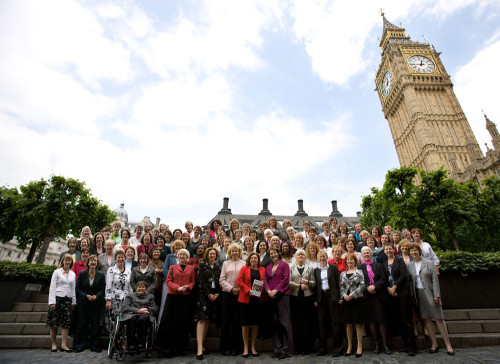Right, let’s get this out the way: the reaction to the ‘pink van’ was somewhat predictable, and could have been avoided. But a bit of pinkwashing should not be allowed to obscure how important Labour’s efforts to engage with women – and to change their lives – are, in a political system that is still heavily dominated by men.

We should be proud to be part of a party which takes women seriously. The alternative to the tour launched today to speak to women voters across the country is not a gender neutral yet feminist election campaign. It is the absence of women’s voices – in the election campaign, in policy development, at hustings and political meetings where too often women are cautious about putting their hand up or are overlooked when they do.
Women, other than political wives, are too often missing from the election trail. Election campaigns can feel like men talking to men. As a result, the issues that affect us intimately are absent from campaign materials. The pay gap, part time working, childcare, caring, losing your job because you get pregnant, feeling and being unsafe on public transport or walking down the street, at work or at home: historically these have been sidelined or completely omitted.
And both Labour and women have paid for this. At the last election, over 9 million women chose not to vote. Only 39% of women aged 18-24 voted compared to 50% of men. Labour paid the price of not reaching out to these women. The disproportionate impact on women of the Coalition’s austerity as a result of our loss has been devastating.
So, far from feeling patronised, I feel relieved that a party – our party – recognises that women not only hold power in elections, but that their voices must be heard to win power, and to build a society that doesn’t leave women at a disadvantage.
Over the past few years, Labour has worked hard to listen to listen to our voices. Work such as Fiona MacTaggart’s ‘listening exercises’ with women which revealed that many feel unsafe on public transport, for example. The Older Women’s Commission which met with older women across the country to feed into Labour’s policy. Constituency Labour Party women’s forums. The support of the women’s PLP – and of men across the party – has been fundamental to the success of Fabian Women’s Network. Mentoring individual women to develop their political skills, promoting the network, and crucially attending our policy events to listen to the ideas and experiences of our members, on everything from mental health, to foreign policy, to the cost of living, to – yes – childcare.
What matters most is not the colour of the van, or the soundbite, but what Labour will do in power. It increasingly looks like the concerns we have raised will be reflected in Labour’s manifesto. The tour also suggests that the party recognises the tremendous talent of the women in the Parliamentary Labour Party and of those who are Prospective Parliamentary Candidates, and is putting them front and centre.
While Cameron, Clegg et al struggle to recognise women within their own parties, and to improve the lives of women across the country, Labour’s recognition of the importance to listening to women – and letting them speak – can only be a good thing. Even if it comes in pink.




More from LabourList
Joani Reid resigns Labour Party whip after husband accused of spying
‘Labour won’t win back left defectors with squeeze messaging alone’
‘Help shape the next stage of Labour’s national renewal through the 2026 NPF consultation’